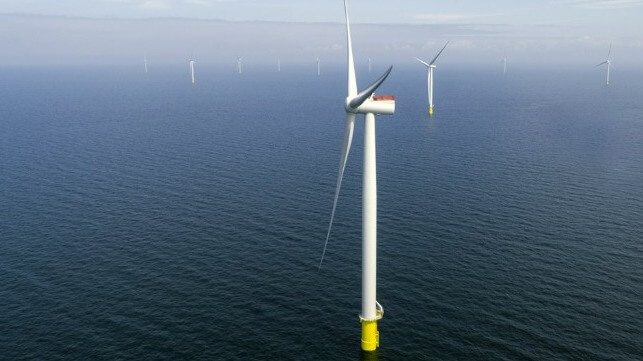UK Bows to Pressure, Hiking Auction Price of Offshore Wind

The UK government is overhauling the pricing for energy generated from offshore wind as well as other changes to its programs as it looks to reinvigorate an industry slumping under rising costs and supply chain problems. Once the overall leader in offshore wind and renewable energy, the UK faltered in September 2023 when developers failed to bid in the latest round of auctions.
The government had promised to review the process and its approach to the industry in the face of the well-publicized challenges brought on by global inflation, supply chain problems, lack of capacity, and other challenges for offshore wind development. In addition to not receiving bids in the last auction, the UK like the U.S. has seen pending projects put on hold. Swedish company Vattenfall, which is one of the leaders in offshore wind, announced in July 2023 that it had shelved plans for a UK wind farm due to come online in 2027 providing 1.4 GW as the first phase in an area that might generate a total capacity of 3.6 GW. Ørsted also recently warned that it was reviewing planned UK projects after the company backed out of large projects in the U.S. over rising costs and diminished returns.
The UK government highlights that it has awarded contracts totaling around 30 GW of renewable capacity in the decade since 2014. Five of the world’s largest operational wind farms are in the UK with the country having gone from six percent of its electric energy from renewables in 2010 to 48 percent in the first quarter of this year.
“We recognize that there have been global challenges in this sector and our new annual auction allows us to reflect this,” said UK Energy Security Secretary Claire Coutinho. “Today we have started the process of our latest Contracts for Difference auction for renewables, opening in March next year.”
Following what the government called an extensive review of the industry, for the annual auction in 2024 the government is raising the maximum price offshore wind and other renewable energy projects can receive under the Contracts for Difference (CfD) scheme, a system that guarantees the price for electricity generated. Experts cite the program as having been a key contributor to the UK’s success in developing offshore wind and renewables and while the energy price to consumers will increase, they contend it is still the most economical source of electricity.
The UK is increasing the maximum price for offshore wind projects by two-thirds (66 percent) going from approximately $55 per MWh to nearly $91 per MWh on fixed-bottom projects. For floating wind projects, the pricing will be increased by 52 percent to nearly $220 per MWh. Under the CdF scheme, the government makes up the difference if energy prices fall below the set levels, while operators have to pay back consumers if energy prices go above the levels set out by the government.
According to the UK’s Department for Energy Security and Net Zero which announced the changes today, the dramatic price increases will ensure the projects are sustainably priced and economically viable to compete in the next round of auctions. Developers in the U.S. have been seeking similar allowances asking state regulators to permit them to renegotiate their power purchase agreements with local utilities. Massachusetts and New York, for example, both refused the applications from developers triggering a scenario where the developers have walked away from their projects preferring to pay cancelation penalties and let the projects be rebid as opposed to proceeding under the negotiated terms.
The UK government reports it is also dedicating a separate funding pot to offshore wind and renewables in anticipation of a high number of projects as a result of these changes. The ministers are contending that the move provides further clarity and confidence in the offshore wind sector. Dan McGrail, CEO of RenewableUK predicted that there would be record investment next year with at least 10 projects likely to be eligible able to power 8.5 million homes and reduce the UK’s need for gas by 39 percent.

that matters most
Get the latest maritime news delivered to your inbox daily.
“We very much welcome the government responding to the increased global competition and the economic challenges facing developers by showing more ambition and giving greater confidence to investors, which will help build a domestic green powerhouse that benefits our own economy and people,” said Emma Pinchbeck, Energy UK’s Chief Executive.
The government also in the announcement issued today, November 16, proposed additional changes to the system to further enhance development. They have already switched to an annual auction process to encourage developers. Starting with the 2025 auctions, it plans to add in additional criteria including the project’s ability to reduce carbon emissions in its supply chains. The government plans to look for additional elements beyond just a low price in choosing future projects.
